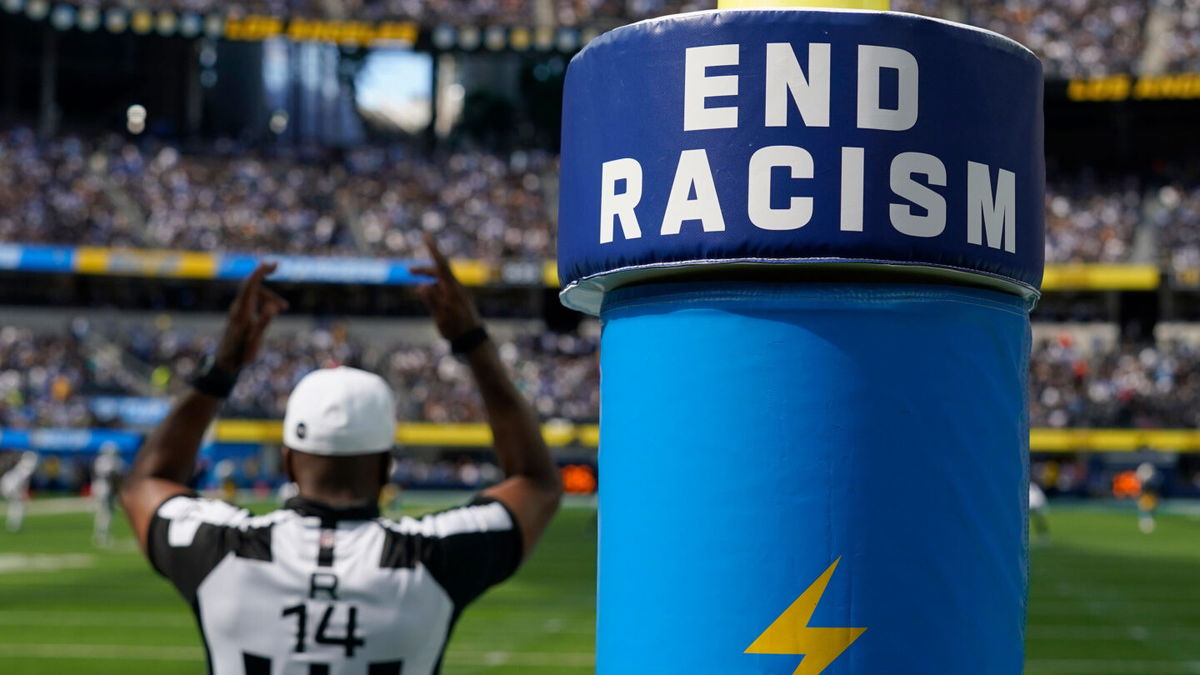Black NFL coaches perform about as well as White coaches but face hurdles to getting and holding the job, Washington Post finds

An "End Racism" sign is shown on a goal post during an NFL game on September 11. Black NFL head coaches regularly perform about as well as White NFL head coaches yet face significant hurdles to getting and keeping their jobs.
By Eric Levenson, CNN
Black NFL head coaches regularly perform about as well as White NFL head coaches yet face significant hurdles to getting and keeping their jobs, according to a Washington Post analysis published Wednesday.
Titled “How the NFL Blocks Black Coaches,” the in-depth story examines the short history of Black NFL coaches, dating to when Art Shell was hired by the Los Angeles Raiders in 1989 as the first Black head coach in modern history. Since then, there have been 191 people hired as head coaches, yet just 24 have been Black — a “glaring shortcoming” for a league in which a majority of the players are Black, the Post notes.
This season, there are three Black head coaches: Todd Bowles of the Tampa Bay Buccaneers, Lovie Smith of the Houston Texans and Mike Tomlin of the Pittsburgh Steelers. That is the same number of Black head coaches as in 2003, when the NFL — facing pressure for its lack of representation — introduced a new policy known as the “Rooney Rule” requiring teams to interview at least one candidate of color for head coach and front office jobs.
The Rooney Rule was recently updated, in part, to require teams to interview at least two external minority candidates for open head coach positions.
The Post interviewed 16 of the 24 Black coaches and features three decades worth of data analysis, graphs, videos and more explaining the hurdles Black coaches face.
“It seems like the criteria moves,” Leslie Frazier, former head coach of the Minnesota Vikings — who was fired a year after taking the team to the playoffs — and is now the defensive coordinator for the Buffalo Bills, told the Post. “One week, or one year, it’s ‘We want an offensive-minded guy.’ Another year: ‘We want a guy with a Super Bowl-winning background.’ What’s the criteria? Sometimes it’s because he’s ‘a great leader.’ Sometimes it’s because he ‘came up the same way I came up.’ But the common theme … is [an owner is going] to hire someone that looks like that owner.”
The issue was highlighted in February when Brian Flores, the former Miami Dolphins head coach, filed a lawsuit against the NFL and three teams alleging racial discrimination. Flores, who is Black, said in his lawsuit that the New York Giants and Denver Broncos interviewed him for their vacant head coaching job under disingenuous circumstances to be in compliance with the Rooney Rule.
Former Arizona Cardinals head coach Steve Wilks and longtime NFL assistant Ray Horton joined Flores’ lawsuit in April, similarly alleging discriminatory conduct.
The NFL called the allegations in the lawsuit meritless. “The NFL and our clubs are deeply committed to ensuring equitable employment practices and continue to make progress in providing equitable opportunities throughout our organizations,” the league said in a statement. “Diversity is core to everything we do, and there are few issues on which our clubs and our internal leadership team spend more time.”
The Dolphins, Broncos and Giants have also denied wrongdoing.
In response to the lawsuit, the NFL and teams have filed a motion to move the case to arbitration and stay further court proceedings, according to court documents.
What holds Black coaches back
In response to the Posts’ findings, Troy Vincent, the NFL’s executive vice president of football operations, told the Post, “At the end of the day, we don’t make the hires.”
“We’ve exhausted ourselves with programs, initiatives, making sure that [owners] are aware of who’s out there [as candidates]. But we don’t make the hire. And so it’s been a difficult challenge for us, but we’ve got to keep pushing. And we believe that what we’re doing is the right thing until hearts change,” he said.
The Post story identified several key issues Black coaches are forced to tackle. It focuses on the shortcomings of the Rooney Rule and highlights comments from Black coaches who say they were given sham interviews so that teams comply with the rule.
In addition, teams have increasingly hired coaches who previously served as offensive coordinator or quarterbacks coach, yet from 1999-2021, 86% of the offensive quarterback jobs were filled by White coaches, the Post writes.
Black coaches also “languish” as assistants and position coaches before becoming head coaches. “The Black men who became NFL head coaches in the past decade, on average, had spent more than nine years longer than their White counterparts in mid-level assistant jobs and three years fewer as coordinators,” the paper reports.
Finally, even when they are hired, they are held to a higher standard and winning does not necessarily save them, the Post wrote.
“Since 1990, a Black head coach who wins at least nine games and a White coach who wins at least six have roughly the same chance of being fired,” the analysis found.
CNN has reached out to the NFL for comment.
The-CNN-Wire
™ & © 2022 Cable News Network, Inc., a Warner Bros. Discovery Company. All rights reserved.